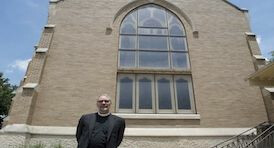Three Cheers for Oliver

This blog entry is quite simply a commendation of a recent argument by Oliver O’Donovan, the Regius Professor emeritus at Oxford, and more recently at Edinburgh. What isn’t simple is that the argument is in the midst of his critique of the case for same-sex marriage in the Scottish Episcopal Church. However the point he is making is not, strictly speaking, about that- in fact he makes it along the way.
One often hears that we Anglicans ply our theological trade according to the ‘three-legged stool’: Scripture, Tradition, and Reason. All count, and presumably, there would be case where, in the words of Meatloaf, ‘two outta three ain’t bad.’ But thinking of the triad as a checklist of separate items is a mistake, and O’Donovan offers us a better way to think of the matter. Forgive the extended quotations, but there are necessary to convey his point:
About scripture O’Donovan wrote, “The authority of the scripture is experienced through its capacity to give us a purchase on the world we inhabit. The whole point of thinking by reading Scripture (always in dialogue with tradition) is to understand our selves where we are).”
“There is a logical sequence in the two discernments, which canot be inverted, and yet we have to make them together and in parallel, for it is the discernment of Scripture that provides us with the categories and analogies we need for discerning ourselves.”
O’Donovan is making a point about how we as Christians think about things, and he is integrating the triad into his account. Scripture locates us, from that fullest of perspectives beginning with God. But this is not done ‘solo,’ but in relation to those who have preceded us, and who accompany us. Our questions are related to, confirm or challenge theirs. Where we are is in a ‘cloud of witnesses.’ And where we are informs who we are, and is inseparable from what we are to do, and so where we are headed. The joint between identity and action requires arguments. These latter two features of Christian understanding conform to what we call ‘tradition’ and ‘reason.’
On Tradition, O’Donovan said, “…subject to reasoned Scriptural critique, of responsible Christian action. The tradition of the undivided church was an ideal for Reformation to aspire to conform to. The claim of Tradition is a moral claim, because sums up what we owe the community that taught us how to believe and act. When we face new questions requiring new answers, we must seek to locate them within the horizon of questions that have been asked and answered before us.”
The implication is this: the triad are not items on a list, but conspire in a trajectory. They function precisely as they make sense together. They are a pointilistic version of proper Biblical interpretation itself. They answer different questions about it. As a result you cannot hive off two-thirds of them on their own.
About Reason, O’Donovan wrote, “The role of “reason” in the Anglican tripod is precisely to make our thinking practical. In any exercise of practical reasoning there are two distinct steps: a discernment of the situation we are in, and a discernment of a course of action open to us in that situation. If it is true of every decision we make for ourselves, it is doubley true of decisions we seek to make together, that we cannon settle on an action until we can envisage the situation in which we are to act.”
This insight is not the end of the matter. In the modern period there remain kinds of interpretation whose primary purpose is to undermine, and all interpretation needs to pay attention to the challenges of the culture of its time. But we do so while we listen to the Scriptures- there is no other activity which has the authority to offer the full account of where and whose, with whom and for what, and so who we really are.
Peace
+GRS



